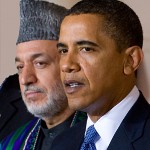Turning a Blind Eye to Afghan Election Fraud
 Obama was quick to rip Burma’s rigged general elections, but as for Afghanistan where election fraud charges have also surfaced, the U.S. stays silent.
Obama was quick to rip Burma’s rigged general elections, but as for Afghanistan where election fraud charges have also surfaced, the U.S. stays silent.
President Obama was quick to speak out against Burma’s rigged general elections. But in Afghanistan where complaints of election fraud have surfaced, the United States has stayed silent.
Earlier this month, the totalitarian military regime of Burma, also known as Myanmar, allowed multi-party elections after almost 20 years of military rule. The general election formed the fifth step of the seven-step "road map to democracy" proposed by the State Peace and Development Council (SPDC) in 2003. The aspirations articulated in the “road map” may sound democratic, but the election results were anything but.
Burma has been under continuous military rule since 1962, and has faced rebellions by its ethnic minorities even before it obtained independence from Britain in 1948. Fighting between ethnic rebels and government troops has sent at least 15,000 refugees fleeing into Thailand. The widely criticized election ushered in a parliament sympathetic to the military regime. Groups representing ethnic minorities (which make up 40% of the population) have warned that civil war could erupt if the military tries to impose its highly centralized constitution and deprive them of rights.
Speaking in New Delhi on Monday, President Obama said it was “unacceptable’ for Burma's government to "steal an election" and hold its people's aspirations hostage to the regime's greed and paranoia.
For a moment, scroll up and re-read the above paragraphs but replacing the words “military” and “dictators” with the name Karzai, and you will get the sense that we could also be speaking of Afghanistan’s parliamentary elections. Yet, while President Obama’s gesture to the people of Burma was noble, it sends a perplexing signal to the Afghans who must wonder why Obama didn’t criticize as “unacceptable” Karzai’s decision to rig the presidential election.
Obviously, the United States does not protect the Burmese dictators nor does the United States spend over $104 billion a year in military operations so the political landscape of Burma shapes in accordance with the will of the Burmese people. On the other hand, the United States does spend more than $104 billion a year on military operations alone to protect Mr. Karzai, who like the Burmese dictators, has robbed Afghans of their basic rights and aspirations, stolen a presidential election and is in the process of stealing the parliamentary elections. So where must the public diplomacy start? If U.S. engagement has to go beyond dealing with the Afghan government, how does the U.S. protect the rights of those not connected with the elites?
Recent reports in Kabul suggest that Karzai had invited the chair of the Independent Election Commission and a member of the Electoral Complaints Commission to dinner in hopes of convincing them to certify the vote. Furthermore, Karzai’s co-conspirators at the office of the Attorney General allegedly threatened the commissioners with an administrative misconduct charge if the election results did not meet Karzai’s expectations.
The controversy has dashed hopes from Afghan officials and international monitors that this year's parliamentary campaign would go more smoothly than last year's presidential election, during which Mr. Karzai was returned to office despite widespread fraud.
"We don't want warlords in this government anymore. We don't want a corrupt administration like before. We want Karzai to respect democracy," said Austad Khpalwak Lakenkhil, a candidate who lost his bid for election from the ethnic Kuchi tribe, which is guaranteed 10 reserved seats in parliament. "We want a recount in front of all the candidates and the international community. And for those who tried to destroy democracy, we want them to be punished and sent to jail.”
Well, good luck to you, Mr. Lakenkhil – It appears now that the most serious threats to Afghanistan’s young democracy not only come from Pakistan and its criminal surrogates, the Taliban, but from Kabul. Obama was right to press Burmese dictators to put aside their greed and paranoia and allow the democratic process to determine the outcome of the elections. Was Afghan President Karzai also listening?